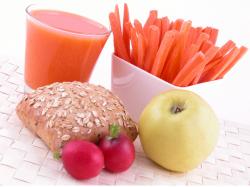PBH: Bunches Of Fruits & Veggies To Highlight School Lunches
January 26, 2012 | 3 min to read

Hockessin, Del.– First lady Michelle Obama and Agriculture Secretary Tom Vilsack, joined by celebrity chef Rachel Ray, announced today that school lunches will now have more fruits and vegetables, along with whole grains, less sodium, and include only milk that is low in fat. The new rules are the first major nutritional overhaul of school meals in 15 years, and are aimed at helping to fight the childhood obesity epidemic across the country.
The new rules will apply to lunches subsidized by the federal government, and the Healthy, Hunger Free Kids Act of 2011 will help school districts to pay for some of the increased costs associated with the new rules. The bill also extended, for the first time, nutrition standards to other foods sold in schools that are not subsidized by the federal government, including ‘a la carte’ foods on the lunch line and snacks in vending machines. Many schools have already taken steps to decrease the amount of fat, salt and calories in meals, and have purchased salad bars and fruit smoothie bars for the cafeteria as a way to increase the nutritional value of school meals and healthier food options.
PBH is extremely pleased with the new U.S. Department of Agriculture guidelines aimed at helping schools to provide the healthiest and most nutritious lunches possible to our nation’s school children,” says Elizabeth Pivonka, Ph.D., R.D., president and CEO of Produce for Better Health Foundation (PBH) the nonprofit entity in partnership with CDC behind the Fruits & Veggies—More Matters national public health initiative. “The new guidelines are a perfect complement and support mechanism to the recommendation to make half the plate fruits and vegetables, whether fresh, frozen, canned, dried or 100% fruit or vegetable juice. PBH is proud to help a number of school nutritionists and school foodservice directors across the country in their nutrition education efforts by offering a vast array of free information and resources on the PBH Foundation and Fruits & Veggies—More Matters websites, as well as nominally priced posters to display in lunchrooms and other promotional items available on the PBH Catalog website. Many schools have shared how pleased they are with our new nutrition education materials and tools to help them promote their school salad bars.”
PBH offers a comprehensive list of schools having salad bars, participating in the USDA fresh fruit and vegetable program, and those having healthy vending machines in our Fruits & Veggies In Your Community searchable database as another resource and tool for school administrators and parents. PBH will continue to promote the consumption of fruits and vegetables to consumers because all forms matter for better health.
About Produce for Better Health Foundation
Produce for Better Health Foundation (PBH) is a non-profit 501 (c) (3) fruit and vegetable education foundation. Since 1991, PBH works to motivate people to eat more fruits and vegetables to improve public health. PBH achieves success through industry and government collaboration, first with the 5 A Day program and now with the Fruits & Veggies—More Matters public health initiative. Fruits & Veggies—More Matters is the nation’s largest public-private, fruit and vegetable nutrition education initiative with Fruit and Vegetable Nutrition Coordinators in each state, territory and the military. To learn more, visit www.PBHFoundation.org and www.FruitsandVeggiesMoreMatters.org. Follow Fruits & Veggies—More Matters on Facebook or Twitter.
PBH is also a member and co-chair with Centers for Disease Control & Prevention (CDC) of the National Fruit & Vegetable Alliance (NFVA), consisting of government agencies, non-profit organizations, and industry working to collaboratively and synergistically achieve increased nationwide access and demand for all forms of fruits and vegetables for improved public health. To learn more, visit www.NFVA.org.
Source: Produce for Better Health Foundation
